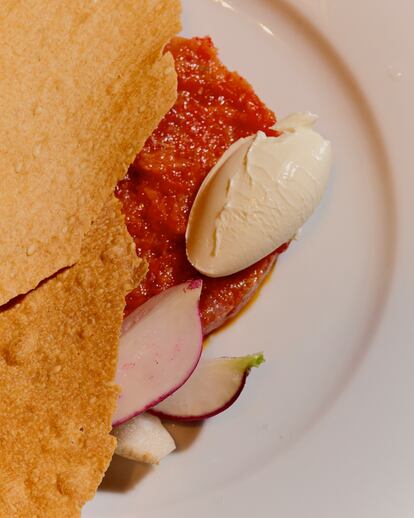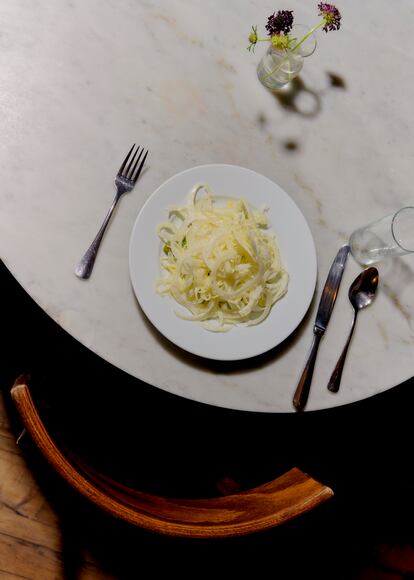Uruguayan chef Ignacio Mattos (Santa Lucía, Uruguay, 45 years old) is famous in New York for being a seemingly normal guy from whom extraordinary cuisine emerges. Estela, with its Michelin star, is his flagship, recognized even by Barack Obama himself, and which celebrated his tenth anniversary in 2023. But after him came Altro Paradiso, another Italian newspaper and where he received El País Semanal, and his Milanese adventure in the heart of Rockefeller Center, which he baptized Lodi. Now Mattos faces a change of cycle, since in August he will leave two of his creations: the Corner Bar and the family’s youngest, Swan Room, at the Orchard Hotel. But he is already embarking on new projects, which he does not want to reveal yet.
All of these establishments, he says unequivocally, are aimed at a customer willing to spend. “If the food is cheap, someone is getting screwed. Simple. Where are they catching the fish for the dumplings? Where does the pig come from for I don’t know what? How do they pay people? Let’s be sensible and honest. In a city where people go out to eat an average of five or six times a week, perhaps we should eat out less and be much more intentional,” explains Mattos. To the bread, bread, and to the wine, wine. It is the only recipe that follows. Born in Uruguay but strongly influenced by his grandmother of Italian origin, after an early and frustrated soccer vocation, he focused his attention on cooking and realized that he had to go out in search of flavors, smells and languages other than his own. “There’s nothing like trying something for the first time,” he says. He passed through Spain, Argentina—where he was sponsored by Francis Mallmann—and Brazil before arriving in the United States. Thanks to that journey, Mattos feels free from any culinary homeland and that connects with the pure essence of New York. He values tradition, but he always gives it an unexpected twist, adding a counterbalance that explodes on the palate. From Europe he takes the culture of quality product cuisine, the warmth of treatment and his eyes light up talking about a simple but delicious coffee at the Lisbon airport. He is critical of the United States, where he prevails “that harshness that they don’t know what romance is, what is sensual. It’s pornographic, it’s Disneyland”, but he recognizes that “there is a demand, there is room to develop a lot of things that young people can do. Everything is cooler. In Europe it is much more complicated, there are houses that have tradition and you have to wait for the generations to pass.”
From Spain he remembers the turbot he ate at the Elkano restaurant, in Getaria (Gipuzkoa), and also how he was “exploited as an intern.” “Can it be justified? Maybe not. But what I learned from all that is that it is very easy to judge and what I took from that experience is: how are you going to do it better? I returned to that place as a customer. I went to not wanting to like it, poisoned. But honestly, it was amazing,” he explains. Now, from the top of the pyramid, although he is committed to respect above all, he is clear: “You have to tighten the screws to go where no one else goes. The one who works the hardest, the one who commits the most, comes. And people now are not realistic, they have no resistance or commitment.” The conversation drifts towards cancel culture: “We fail as a society and as individuals when we lose our ability to communicate in a human way. Nobody wants to say what they think because they cross you. But those who put up the cross are privileged with educational access, boring. “It’s all leisure,” he says.
Mattos believes more in actions than in words: he gets up at five in the morning, goes to the gym, and at seven in the morning he rides his bicycle to the Union Square farmers market, looking with love and judgment at the product. and the producer. He applies the same rigor to all other parts of the process. “If you have to clean, then you have to clean. If you have to take out the trash, you take out the trash,” he describes. He takes care of the decoration, and takes care of the experience from the moment you enter to the moment you leave any of his five restaurants. You can’t let your guard down. “New York has no benevolence. Most stores close within six months or a year.”

What do you do when Barack and Michelle Obama sit at your table, as happened in 2014? “It was science fiction. I don’t know how many cars, helicopters, snipers, secret services… What impressed me most was the level of coordination and professionalism.” Only one thing failed: “There was a problem with the account, that his card did not pass and we did not say anything, but it was he himself who realized it. The press put all the pieces together and there was a mess. He made a joke and Michelle paid. They are very normal, very pleasant. They are divine,” he recalls 10 years later.
Faced with so many demands, so much balancing budgets and so much press, Mattos, like all adoption New Yorkers, looks for a space for compensation in his home. He lives in Tribeca with Egyptian artist Laila Gohar—who makes food-based conceptual art—and her one-year-old daughter. There the rules are different, almost opposite. “We try to instill something that is rare here: friends coming over and being able to ring the doorbell and have dinner at home at the last minute.” No reservations, and he tries to avoid recipes. And his children (he has two, but the oldest lives in Brazil) are forced to eat everything. “The big one, three years old, was eating omakase. “They are spoiled, but on the other hand I think that if we treat children like babies we make them inept.” Where the public and the private do come together is the same philosophy of life of Mattos: “Human beings are ashamed of having to serve, but I believe that it is the best thing we can do, it is the greatest contribution to the world. Either way: teaching, caring for someone. Serve a plate, clean the table. But making the other feel that they have dignity,” he concludes.

#Ignacio #Mattos #cooks #York #point
